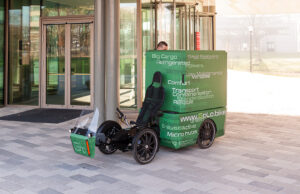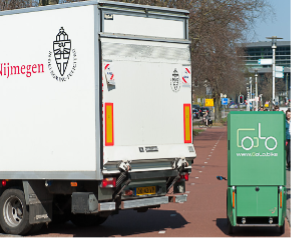Make use of cargobikes for multiple logistic flows
In collaboration with HAN University of Applied Sciences, Radboud University, Flevobike and Velocity, Living Lab Campus Heijendaal it is researched how a more sustainable and liveable Campus Heijendaal in Nijmegen can be achieved by the use of a Coolbike; a cargo bike with a cooled cargo unit. We looked at developing innovative solutions for ‘last mile’ on-campus transport.

There are many daily on-campus transport movements. The cargo bike, an electric carrier bicycle for freight, could improve liveability and sustainability on Campus Heijendaal. Although a great deal of research has been conducted on cargo bikes, the specific needs for cargo bikes with refrigerated units – such as temperature monitoring and warning alerts – are not much investigated. Therefore, a pilot is set up for which the Coolbike was used to deliver orders from the catering to meeting rooms.
Our main research question was: “Which integral logistic concepts using the Coolbike as a means of transport are appropriate for a more liveable and sustainable Campus Heijendaal at the lowest possible cost and highest possible service levels, while considering user requirements?”
The integral logistic concept (ILC) was chosen as a research methodology for which consecutively the strategy of a logistical concept, the objectives, the network, planning and control, the needed ICT and the organisation are investigated; and lastly the logistical performance indicators. As a result, a new network and logistical concept was provided, concerning the use of the Coolbike as a means of transport for catering at the RU, noting the effects on the set indicators. Moreover, we determined technical conditions for the loading unit and formulated a concept for the refrigerated container.
For catering purposes, it is not possible to entirely replace truck movements with the Coolbikes; some order volumes are simply too high. However, we found the Coolbike to be suitable for about 75% of the movements; in April 2022 this totalled 14 trips. Furthermore, the Coolbike can be used for other logistical purposes on large parts of the day.
Sustainability
Based on calculations (with assumptions), the annual CO2 emission reduction for catering would be 768 kilograms. However, the Coolbike’s potential is greater. Using one Coolbike all day, constantly replacing truck movements, would result in an annual reduction of approximately 13,800 kilograms’ CO2 emissions at Heijendaal Campus. With regards to catering, the Coolbike is currently used about 6% of the time (9:00-17:00, working day); the rest of the time the Coolbike remains unused.
Liveability
Using the Coolbike for catering purposes has the following effects on the quality of life: less noise pollution, cleaner air, and safer road traffic. As mentioned, currently the Coolbike can replace 75% of the catering truck movements resulting in the following monthly and annual effects on liveability:
– On a monthly basis, the on-campus truck movement-times (drive/parked) will be reduced by about 630 minutes.
– Annually, the on-campus truck movement-times (drive/parked) will be reduced by approximately 6,615 minutes.
How much effect this will really have on reducing noise pollution, preventing accidents, and cleaner air has yet not been investigated. As an indication of the difference between the truck and the cargo bike, see the figure below.

Costs
The data show that for the time being, only one Coolbike and container are needed, as the deployment is not intensive. The total costs of the Coolbike in the first year amount to €26,830 (cargo bike, container and data and temperature monitoring). Other costs (unforeseen, compensation and ICT development) bring the total project costs to €38,330.
Assumptions have been made for other costs and revenues. The costs for carrying out an order by truck is about €100; with the Coolbike these costs are approximately €13.30. To break even with the costs related to the project and the Coolbike (€38,330), 442 orders should be replaced by the Coolbike as a means of transport. This does not include extra annual costs for maintenance, electric charging, etc., as this information was not available during the research period.
Service level
The pilot started in May when the cool container was not yet ready, so there was not enough time and resulting data to fully investigate the service level and draw conclusions. This should be investigated in a follow-up study.
Recommendations and follow-up research
As the potential of using the Coolbike is considerably higher than that of catering alone, other options with the Coolbike were examined. Factors were then determined that could be used for a logistic flow of the Coolbike. The logistic flow for last mile cool-transport has been given a first recommendation; to and from the campus with a Coolbike. For other non-refrigerated logistic flows, we noted interesting options for the distribution of postal packages and books, filling up parking tickets, and small rubbish collection. To achieve greater efficiencies, we recommend combining the use of these on-campus cargo bike(s) with logistic flows from a centralised hub.
